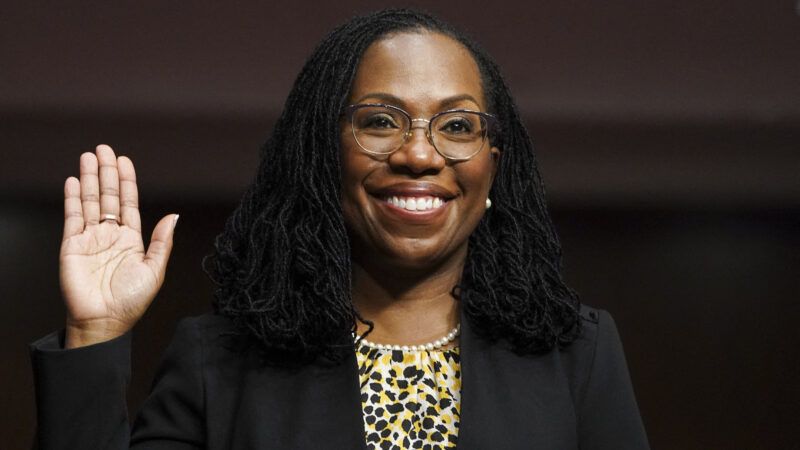Biden Nominates Ketanji Brown Jackson to the Supreme Court
The SCOTUS pick has shown admirable judgment in criminal justice cases.

President Joe Biden has nominated Ketanji Brown Jackson to replace Justice Stephen Breyer on the U.S. Supreme Court.
Jackson is 51 years old and currently serves as a judge on the U.S. Court of Appeals for the District of Columbia Circuit. President Barack Obama appointed her to the U.S. District Court for the District of Columbia in 2012, a position she held until 2021, when Biden elevated her to the federal appellate bench.
Her qualifications are impressive. She graduated cum laude from Harvard Law School and later clerked at the Supreme Court for none other than the retiring Breyer, who has described her as "brilliant."
If confirmed, Jackson would also bring some much-needed professional diversity to the highest court in the land. As Cato Institute criminal justice scholar Clark Neily has pointed out, there is a "wild imbalance" on the federal bench "between judges who used to represent the government in court and judges who used to challenge the government in court." Given that "nearly every court case pitting a lone citizen against the state represents a David-versus-Goliath fight for justice," Neily wrote, "to further stack the deck with judges who are far more likely to have earned their spurs representing Goliath than David is unfair to individual litigants and a bad look for the justice system as a whole."
Jackson's legal background will help to partially right that wild imbalance on the highest court in the land, which is chock full of former government lawyers. Between 2005 and 2007 she worked as an assistant federal public defender in Washington, D.C., a job that certainly involved much battling against the government both in and out of the courtroom. Let's hope that experience stuck with her.
Criminal justice reform advocates will likely cheer this SCOTUS pick. That is because Jackson has shown admirable judgment in cases involving police overreach. Take Patterson v. United States (2013), which centered on the arrest of an Occupy D.C. protester named Anthony Michael Patterson for using profanity in a public park. Officers told Paterson to stop cursing at Tea Party activists. When Patterson refused, he was arrested for disorderly conduct. The charges against him were later dropped.
Patterson sued the officers over his bogus arrest, which was triggered by nothing more than the lawful exercise of his First Amendment rights in a public place. The officers responded by seeking to have the suit thrown out. They invoked the controversial doctrine of qualified immunity, which often shields state officials from being sued over alleged constitutional rights violations. According to the Supreme Court's 1982 decision in Harlow v. Fitzgerald, state actors are entitled to immunity from civil suits arising from their official conduct so long as the conduct that they're being sued over "does not violate clearly established statutory or constitutional rights." In this case, the officers essentially claimed that it was not "clearly established" that the First Amendment protected somebody like Patterson from being arrested for using a four-letter word in public.
In her decision, Jackson practically scoffed at the officers' position and denied them qualified immunity. "The right to be free from a retaliatory arrest in the absence of probable cause is clearly established in this jurisdiction," she wrote. In fact, "a police officer is unquestionably on notice that arresting a speaker solely based on the content of his speech and without probable cause to believe that he has committed a crime is a violation of the First Amendment."
This was not necessarily an open-and-shut case. Other federal judges have rubber-stamped even more egregious police misconduct, awarding qualified immunity despite evidence of obvious constitutional rights violations. To her credit, Jackson held these particular officers to account. "Because no reasonable officer could conclude that there was probable cause to believe that Patterson was committing disorderly conduct on the facts as alleged in the complaint," she concluded, "the complaint ably supports the claim that Patterson was arrested in retaliation for his protected speech and that the individual officers therefore violated Patterson's clearly established First and Fourth Amendment rights."
Here's hoping that the Patterson v. U.S. experience stuck with her too, and that she goes on to play a similarly positive role in any qualified immunity cases that come before her at SCOTUS.
Now that Biden has picked his nominee, the next move is in the hands of the Senate Judiciary Committee, whose Democratic majority will almost certainly advance Jackson's nomination to the full Senate. But first there will be her confirmation hearings before that committee, an event that is certain to be a laughable spectacle full of grandstanding politicians yammering on about legal concepts that they plainly do not understand.
The real question going forward is whether the slim Democratic majority in the Senate will be enough to secure Jackson a spot on the Supreme Court. We will find out soon enough whether the party will close ranks behind Biden's nominee or whether the same small group of Democratic senators that has blocked other items on the Biden agenda will do so again here.


Show Comments (273)